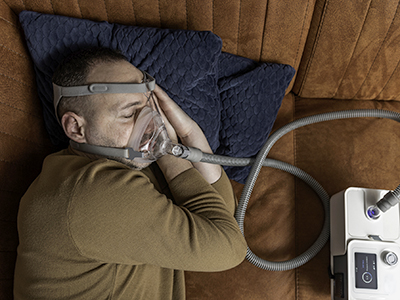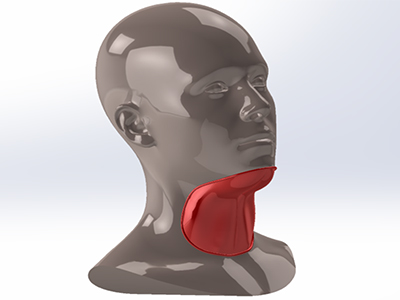
Researchers are developing an effective, affordable and more comfortable treatment to prevent upper airway obstruction during sleep.
People with obstructive sleep apnea (OSA) experience a complete stoppage or a transient reduction in breathing while asleep, which can cause disabling symptoms and long-term health consequences. Current treatments are effective; however, many individuals stop using them due to discomfort, placing them at greater risk of the negative health effects of untreated OSA.

Vancouver Coastal Health Research Institute researcher Dr. John Fleetham and other UBC team members — Dr. Robin Coope, Paul Cubbon, Dr. John Madden and Dr. Lorne Whitehead — are developing a negative airway therapy device that would provide a novel alternative treatment for OSA.
“Our prototype would be akin to a nasal passage opening strip for the neck,” explains Fleetham. “We are designing it to be an effective, comfortable and a more affordable treatment for people with OSA.”

The present recommended treatment for OSA is a continuous positive airway pressure (CPAP) device, which includes a mask worn on the face during sleep. The machine blows air through a tube connected to the mask into the patient’s upper airway, preventing upper airway obstruction.
“When you sleep, all of your muscles relax,” explains Fleetham. “In people with OSA, the relaxing of muscles in the upper airway during sleep closes off the flow of air, leading to recurrent upper airway obstruction and associated asphyxiation.”
The prototype in development by Fleetham and the UBC team would fit over the neck of patients and use negative pressure to keep the upper airway open during sleep.
Negative pressure therapy could increase OSA treatment uptake
Untreated OSA can lead to an increased risk of heart attack, stroke, depression, high blood pressure, sleepiness, infection and cancer. Despite these risks, many people with OSA discontinue using their CPAP machines within two years of commencing treatment, often related to reasons of discomfort when wearing the mask, shares Fleetham. Some individuals may also confront barriers to accessing CPAP due to the cost of the devices, which range in price from around $800 to $3,000 and are not presently covered under the B.C. Medical Services Plan.
“Our aim is that our novel negative pressure therapy device will feel like wearing a scarf while sleeping, making it as comfortable as possible for the patient.”
Targeted to be a fraction of the cost of CPAP machines, the negative pressure therapy device would also lower the affordability barrier, enabling more individuals to benefit from a life-enhancing if not life-saving clinically approved treatment, adds Fleetham.

Fleetham and the UBC team’s project got underway six months ago, springboarding from a COVID-19 pandemic project to identify a negative pressure treatment to treat respiratory disease. The research team anticipates moving their negative pressure therapy prototype through clinical trials and into a real-world application within the next year, with potential commercialization and patient benefits on the horizon.
This project was made possible through philanthropy. Sincere thanks to the Belzberg family, whose generous gift is fueling innovation towards improving the quality of life of patients.


